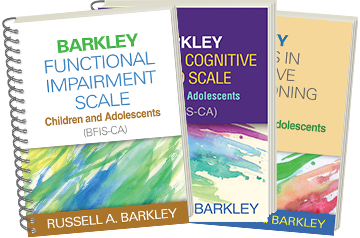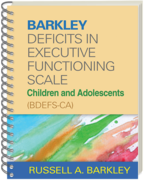Barkley Deficits in Executive Functioning Scale—Children and Adolescents (BDEFS-CA)
Russell A. Barkley
A Paperback Original
A Paperback Original
orderMay 9, 2012
ISBN 9781462503940
Price: $203.00 184 Pages
Size: 8" x 10½"
Convenient Wire Binding
Check out a special package offer including this title!

Read a Q&A with featured author, Russell A. Barkley!
Sign up for emails on upcoming titles by Russell A. Barkley (with special discounts)!
Sign up for emails on upcoming titles by Russell A. Barkley (with special discounts)!
The BDEFS-CA is the culmination of more than 17 years of research and development aimed at identifying the most useful items for the assessment of deficits in executive functioning (EF) in daily life activities. Initially, development of the BDEFS began with forms for use with adults. This manual presents a downward extension of the adult BDEFS, created and normed for use with parents in evaluating their children, ages 6–17 years.
The large normative sample (N=1,922) is representative of the U.S. population in terms of region, socioeconomic status, education, ethnicity/race, and gender, based on the 2000 U.S. Census. Unlike other EF rating scales, the normative sample was not drawn from a single state or region, was not filtered to exclude children receiving special education or psychiatric medications, and did not rely on school staff to initially obtain the sample. It is therefore a true general population sample.
Reliability
Reliability of the scores is quite satisfactory as evidenced by high internal consistency (Cronbach's alpha ranging from .95 to .97 scores across the five scales) and by high test–retest reliability over a 3–5 week interval (ranging from .73 to .82 across scales and .82 for the Total EF Summary Score).
Validity
Validity of the scale scores was evident in numerous analyses, including factor analyses; correlations with other EF rating scales; significant group differences and distinct profile patterns across multiple developmental, learning, psychiatric, and neurological disorders; and correlations, regression analyses, and group comparisons concerning disorder discrimination and concurrent validity with various measures of functional impairment in major life activities (family functioning, peer relations, educational functioning, community activities, and risk for accidental injuries, among other domains.)
More extensive technical information is provided in the manual.
The large normative sample (N=1,922) is representative of the U.S. population in terms of region, socioeconomic status, education, ethnicity/race, and gender, based on the 2000 U.S. Census. Unlike other EF rating scales, the normative sample was not drawn from a single state or region, was not filtered to exclude children receiving special education or psychiatric medications, and did not rely on school staff to initially obtain the sample. It is therefore a true general population sample.
Reliability
Reliability of the scores is quite satisfactory as evidenced by high internal consistency (Cronbach's alpha ranging from .95 to .97 scores across the five scales) and by high test–retest reliability over a 3–5 week interval (ranging from .73 to .82 across scales and .82 for the Total EF Summary Score).
Validity
Validity of the scale scores was evident in numerous analyses, including factor analyses; correlations with other EF rating scales; significant group differences and distinct profile patterns across multiple developmental, learning, psychiatric, and neurological disorders; and correlations, regression analyses, and group comparisons concerning disorder discrimination and concurrent validity with various measures of functional impairment in major life activities (family functioning, peer relations, educational functioning, community activities, and risk for accidental injuries, among other domains.)
More extensive technical information is provided in the manual.



